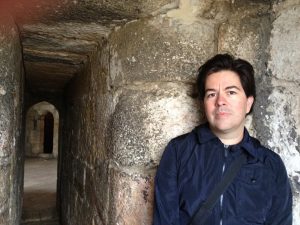(MENAFN- Brazil-Arab News Agency (ANBA)) Thais Sousa
São Paulo – An Arab young man who wishes for a better life, travels in search of treasures and lives fantastic adventures. Palaces, princesses, jewels and a lamp are elements in his path. Yes, that is Aladdin, the character of the tale that was added to the 'Arabian Nights.' It is also Hanna Diyab, a Syrian young man from Aleppo that travelled to Europe in 1709, went to the Versailles Palace and shared stories with the French translator who first published 'Arabian Nights' in a Western language, Antoine Galland.
This encounter led the French writer to publish the Aladdin story. But the rest of conversation was lost in history. While Disney releases a new movie revisiting the classic, a Brazilian professor celebrates the original story he discovered after years of research. Paulo Lemos Horta is specialized in 'Arabian Nights' and is the editor of a new version of the tale Aladdin. He has something in common with the story he is fascinated with. Both Horta and the Arab young man grew under the influence of difference cultures.
His father's profession, a Brazilian diplomat, allowed Horta to live in different countries and cities, including Brasília and Rio de Janeiro. From his mother he inherited a connection with the Aladdin's story. 'My mother from Belém do Pará was an orphan. She was the one that told me the story of Aladdin, the first I can remember. I was curious about how something [Arab] that does not exist [in writing] in Arabic could emerge for the first time in French. That was a mystery to me,' said Horta to ANBA.

Paulo is a Literature professor at New York University and is specialized in 'Arabia Nights'
Paulo became a Literature professor at New York University (NYU) in Abu Dhabi, where he has taught for seven years. During his research, Horta found the journals of the French translators of the book, where they reveal their true sources. The discovery led him to publish the book 'Marvellous Thieves – Secret Authors of the Arabian Nights,' and this year he edited a new version of the original tale of Aladdin (excerpt of the book cover pictured above). He edited the English translation from the French, while the Portuguese edition in Brazil that was published in May has his organization, introduction and a new preface.
The discover of the active participation of an Arab in the story creation is the main reason for the publication. 'The translation took the character of an Arab traveler. The great breakthrough is that we had always thought that most of the literary value had come from the French. Now we know that a great deal of it comes from the Syrian traveler Hanna Diyab. It is not just a French dream about the Arab world. Maybe it is an Arab dream about the French world. Whether he came up with that story, he chose it. It was shared by a teller of stories we didn't know,' Horta said.
To unravel the mystery, Paulo Horta resorted to the journal of Hanna Diyab, who wrote about his encounter with 'an old man who needed stories.' In the same lines, in his journal, Galland mentioned having heard the story of Aladdin from Diyab. Therefore, with the addition of stories told by the Syrian, the French translator could conclude 'Arabian Nights,' which had only 40 stories from the original Arabic manuscript, lasting only 280 nights. 'But he never mentioned Hanna when the story was published,' said the professor, who founded the missing piece, the Syrian's journal, in the Vatican.
Real-life Aladdin?
MENAFN0906201902130000ID1098623030
Legal Disclaimer:
MENAFN provides the information “as is” without warranty of any kind. We do not accept any responsibility or liability for the accuracy, content, images, videos, licenses, completeness, legality, or reliability of the information contained in this article. If you have any complaints or copyright issues related to this article, kindly contact the provider above.